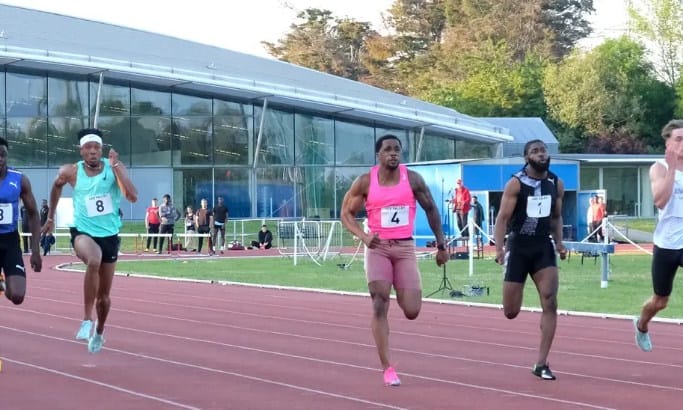Exclusive by Ben Bloom
Having served a 22-month ban for failing a drugs test, the sprinter wants to make up for lost time after making a low-key return
Hidden in plain sight among the teenagers and pensioners who have paid their £14 entry fee to compete at the Lee Valley Sprint Night is a Team GB star who has not stepped onto the track since failing a drugs test at the Tokyo Olympics; a contrite athlete seeking a new beginning.
Cheered on by his close friend Nethaneel Mitchell-Blake – one of the British quartet who lost their Olympic 4×100 metres silver medal because of his actions – CJ Ujah does what for so long had been commonplace: he wins a race. Two, in fact.
“You’re back, my man,” bellows one of the handful of family and friends watching at a largely empty track. The result matters so much less than the act of racing itself. “I feel like a kid again,” says Ujah.
It has been almost two years since one of the country’s fastest ever 100m runners received news that rocked the British sporting establishment. Ujah had failed a drugs test while competing at the Tokyo Olympics, where he had helped Great Britain make the 4x100m podium.
The authorities later determined his anti-doping rule violation “was not intentional as a result of his ingestion of a contaminated supplement”, with Ujah telling the Guardian he had bought the tainted amino acid supplement beta alanine for £10 off Amazon during a Covid lockdown. It was, he admitted, a huge mistake.
Despite taking solace in the verdict that he had not intentionally cheated, he was given a 22-month ban from the sport under strict liability rules that state an athlete is responsible for any substance found in their body.
Where reports of his error and punishment were ubiquitous, his return this week has slid by almost without trace, with Ujah’s suspension quietly expiring when the clock ticked past midnight last Sunday.

On a balmy summer’s evening three days later, he begins his quest to start anew so close to where his whole journey began 29 years earlier. He races twice over 100m at a Lee Valley track located barely more than a mile from his childhood home in north London.
Victory in a marginally wind-assisted first race comes in 10.12sec, while he overcomes a sluggish start to clock a legal 10.20 for another win an hour later. Not bad for an exercise he deems a “rust‑buster”. “I was nervous,” he tells the Guardian. “I felt like I was back in primary school getting ready to race for the first time ever again.
“I wasn’t sure it was going to be that fast, but it’s pretty good to know I’m in some decent shape. Going forward, hopefully I’ll build on it.”
It has, says Ujah, “been a tough journey”. Cast adrift from the sport, for the best part of two years he was unable to meet his coach, train with other athletes or set foot on an elite track. “You have to find the will to get up in the morning and not feel like everyone is against you,” he says. “Remember what your purpose is.”
He spoke to Dwain Chambers, one of very few in British athletics with first-hand experience of such a situation after serving his own two-year drugs ban. The pair embrace after Ujah’s second race on Wednesday night, although Ujah is eager to point out that “my situation is different” from the reformed Chambers, who previously described himself as a “walking junkie” during the height of his doping days.
While Mitchell-Blake’s presence trackside is notable – the pair were socialising together in August 2021 when Ujah received the email informing him of his failed test – Ujah knows he will probably not be welcomed so warmly by all of his former teammates. Richard Kilty described Ujah as “sloppy and reckless” after the ban was confirmed. They have not spoken since.
“I’ve just been keeping my head down,” says Ujah. “They say time heals so hopefully, although they will never forget, they might forgive. I’ve just got to do my part on the track. If you genuinely actually did it [cheat] then you’d be like: ‘Oh, I got caught.’ But the fact that it happened and it was such a shock and I couldn’t believe it – I feel like that moment was my darkest day. Everything now I’m ready to take, good and bad.”
He says the general response has been positive since he was allowed to resume training with his coach and team two months before his ban expired. “It was crazy when I walked in, a lot of people showed me a lot of love,” he says. “You never know what kind of reaction you’re going to get. It’s been genuine from everyone so far, so I can’t complain.
“Online there’s obviously guys that hide behind screens and trolls. It’s not the same energy in real life. I made a mistake, I’m not going to deny that. But I’m back here to fulfil my potential and move on.”

With the British championships less than a month away, he faces a race against time to qualify for August’s world championships, although his only wind-legal time from Wednesday already ranks him fourth in the country this year.
He confirms he is yet to have any contact with the UK Athletics technical director, Stephen Maguire – “I’ve only just been allowed to run so he probably thought there’s no need to have a conversation before then” – and does not expect to be part of the relay setup this summer, with next year’s Paris Olympics more likely.
“I’ve just got to get used to competing again,” he says. “If I’m back in time for the world champs then I’m back in time. If not then I’m not and the aim is Paris. I’m looking to be better than I’ve been before.”
Source: https://www.theguardian.com/sport/2023/jun/10/athletics-cj-ujah-interview-ban-team-gb-paris-olympics
